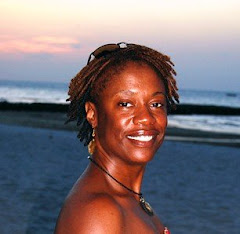 Listening to the story of Zainab Bangura on the BBC World Service this morning put me a bit behind schedule, but I'm so glad it did.
Listening to the story of Zainab Bangura on the BBC World Service this morning put me a bit behind schedule, but I'm so glad it did.She had me at "Mother." That is, her description of how her mother sacrificed everything to make sure she received an education in their tiny Sierra Leone village. Her Muslim cleric father agreed--up to a point. That would be age 12, when he declared she had learned enough and needed to get married.
Zainab's mother refused to let that happen. She herself had never gone to school, couldn't read or write, and married young. She was determined it would not happen to her only child. She even threatened to end the marriage if her husband insisted. He took her up on that, and so Zainab and her mother were pretty much on their own afterwards.
I've lived on the African continent long enough to grasp exactly what being "on your own" here means. When you have nothing, and no way to change your circumstances, and you're scratching out a means of survival in ways that challenge your health, safety and dignity on a daily basis, when is there time to think about education, and careers...even the future in the most generic sense? And though tomorrow is not promised to any of us, some people have even less of a reason to believe they'll see one more dawn.
On the other hand, I DO know what it's like to have a mother who was willing to do whatever it took to make sure her daughters were able to fend for themselves on American soil. My challenges as a poor black girl in the Midwest seem trivial compared to what Zainab Bangura endured in war-ravaged Sierra Leone. But there was a common thread--we both had mothers propelling us forward. Making sure we got an education. Demanding that we hold our heads high, keep our legs closed and imagine a successful future for ourselves. Women whose own dreams had been literally strangled, but who damned sure weren't going to let that happen to their own daughters.
It's a fascinating thing, when you think about it. Now, speaking for myself, I'm not saying that matrilineal propulsion came without a significant psychic toll--on me. Frankly, Eloise Jones put a kind of a man-hating spin on all of her admonitions that inevitably left a deep subconscious imprint I'm still grappling with. It wasn't quite "Men ain't shit, so don't be a sucker and expect them to take care of you," but it was damned close. And considering that during my early years, she had given birth to 10 children was cleaning house and helping care for some white woman's kids on the other side of town, and was STILL poor while she was dispensing that advice, I was definitely programmed to take heed.
Besides, Zainab's father, and mine, were pretty much prisoners of their own lives and upbringings. Lewis Jones was born in 1916 Mississippi, without a single thing in his life to shape him into a strong, vocal, caring, interactive parent. Zainab's father was a Muslim cleric who was simply following his faith and a 1,000 years of cultural practice. Heck, Zainab was lucky he let her go to school at all, I suppose. Marriage at age 12, to some crusty old goat, was just the way life was. But somehow, without a supportive, interactive male influence, we both endured.
Guess I'm burying the lead a bit. You know who I am. Zainab Bangura is now the Minister for Foreign Affairs for Sierra Leone. The first woman to hold that job, I believe, and she was also the first woman to run for President (unsuccessfully) in 2002. She's married with one child, a son, and a lot of the people interviewed for the story describe her as pushy, impatient and egotistical. She may be all of those things.
But here's one thing I've become utterly convinced of. As long as the majority of women on the African continent are oppressed, subjugated, abused, exploited and denied opportunities for education and advancement, Africa will never--EVER--truly progress. I don't need to argue that point. Zainab's story proves it. If her life had followed its seemingly inexhorable pattern, she'd be a weathered, mute, bowed and bent grandmother by now...IF she was still alive.
Here's the thing. Tens of thousands of women die or are seriously maimed during childbirth each year on the African continent. An equal number are left mutilated by female circumcision. Exponentially more are consigned to early, polygamous marriage, which endangers their health and denies them education.
I don't know about you, but to me, that just translates into a horrifying waste of one of the most powerful natural resources on the face of the Earth. It doesn't make business or development sense--for example, women perform more than two-thirds of the agricultural labor in African countries. It doesn't even make common sense. I know I won't live to see this situation change significantly, but as long as I'm working in this region, I'm gonna do what I can to help move the ball in the right direction.
It's what my Mama, and Zainab's Mama, expected of us.





No comments:
Post a Comment